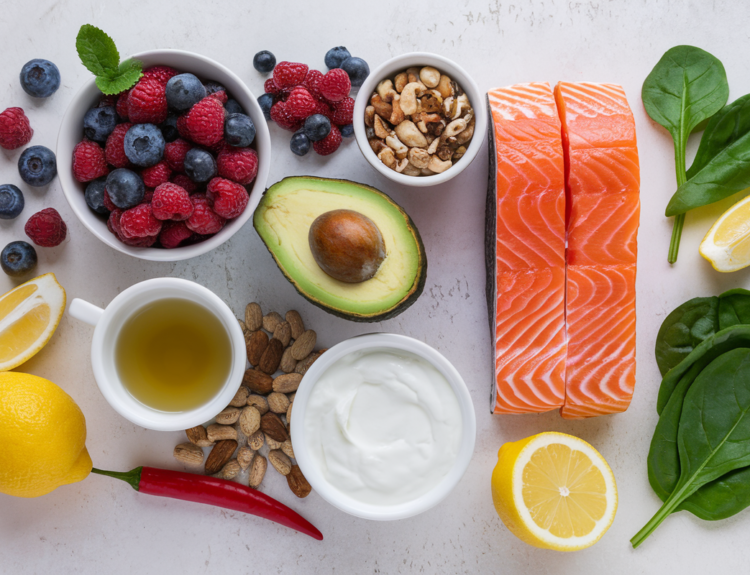Does pineapple increase testosterone? This question has piqued the curiosity of health enthusiasts and researchers as they delve into the potential influence of this tropical fruit on hormonal balance. Whether you’re curious about boosting your testosterone levels naturally or want to learn about the wide-ranging benefits of pineapple, this article provides a comprehensive look at how this tropical fruit might impact your health.
Does pineapple increase testosterone? Explore its health benefits and how this tropical fruit may influence hormone levels.
In this article:
- Nutritional Profile of Pineapple
- How Pineapple Affects Hormone Levels
- Health Benefits of Pineapple Beyond Testosterone
- Potential Side Effects and Considerations
- Incorporating Pineapple into Your Diet
NUTRITIONAL PROFILE OF PINEAPPLE
Pineapple is a delicious tropical fruit known for its rich content of vitamins, minerals, and enzymes. Scientifically named Ananas comosus, this fruit is low in calories yet high in essential nutrients, making it a valuable addition to a balanced diet.
A typical serving of fresh pineapple (about 100 grams) provides approximately 50 calories, primarily from carbohydrates. Pineapple is an excellent source of vitamin C, delivering more than 70% of the recommended daily intake. This vitamin is vital for immune function, collagen synthesis, and protection against free radicals through its antioxidant properties. Pineapple also contains substantial amounts of manganese, which supports bone health, metabolism, and antioxidant activity.
Additionally, pineapple contains smaller amounts of vitamins A, B6, E, and K and minerals like potassium, magnesium, and copper. Potassium helps regulate blood pressure, while magnesium supports muscle function.
One of pineapple’s most notable components is bromelain, a group of enzymes with unique anti-inflammatory and digestive properties. Bromelain aids in protein digestion and may help reduce inflammation, improve digestion, and provide relief from conditions like sinusitis and osteoarthritis.
The high fiber content in pineapple promotes digestive health by encouraging regular bowel movements and offering a sense of fullness, which can assist in weight management. With its diverse array of nutrients, pineapple is a versatile fruit that supports overall health and wellness.
HOW PINEAPPLE AFFECTS HORMONE LEVELS
Pineapple has garnered interest for its potential influence on hormone levels, primarily due to its rich content of nutrients and unique enzymes. One notable compound in pineapple is bromelain. While bromelain does not directly affect testosterone levels, it may help reduce inflammation, indirectly supporting hormonal balance.
Another vital component is manganese, an essential trace mineral. Manganese plays a role in synthesizing sex hormones, including testosterone. While a manganese deficiency can lead to hormonal imbalances, it is crucial to note that manganese alone is not a direct testosterone booster.
Pineapple also contains small amounts of an enzyme called aromatase, which can convert testosterone into estrogen, the primary female sex hormone. Although the aromatase content in pineapple is not substantial enough to cause significant hormonal shifts, excessive consumption might affect the testosterone-to-estrogen ratio, especially if other factors influencing hormone balance are also present.
While pineapple provides nutrients that support overall hormonal health, its direct impact on testosterone levels is minimal. Instead, pineapple contributes to hormonal balance through its anti-inflammatory properties, enzyme content, and essential nutrients.
HEALTH BENEFITS OF PINEAPPLE BEYOND TESTOSTERONE
Pineapple is renowned for its tropical flavor and numerous health benefits that extend far beyond its potential impact on hormone levels. This tropical fruit contains various nutrients, enzymes, and antioxidants contributing to overall health and well-being.
One of pineapple’s primary health benefits is its anti-inflammatory properties. Bromelain, an enzyme found abundantly in pineapple, has been shown to reduce inflammation and may aid in healing following surgeries or injuries. This enzyme can also alleviate symptoms of inflammatory conditions such as arthritis, helping to reduce joint pain and swelling.
Pineapple is also a rich dietary fiber source, supporting digestive health. The fiber content in pineapple promotes healthy bowel movements, prevents constipation, and aids in maintaining a balanced gut microbiome. Additionally, bromelain aids digestion by breaking down proteins more efficiently, potentially reducing bloating and improving nutrient absorption.
Pineapple’s high vitamin C content makes it a powerful antioxidant. It boosts the immune system by protecting cells from damage caused by free radicals, which can help reduce the risk of chronic diseases such as heart disease and certain types of cancer. Vitamin C is also essential for collagen production, which supports skin health by improving elasticity and reducing the appearance of wrinkles.
Moreover, pineapple contains other vital nutrients such as manganese, potassium, and B vitamins, contributing to bone health, heart function, and energy metabolism.
Pineapple adds a delicious and nutritious element to your healthy lifestyle.
POTENTIAL SIDE EFFECTS AND CONSIDERATIONS
Consuming pineapple in moderation is generally safe for most people, but excessive intake can lead to some health issues.
One common concern with pineapple is its acidity. Pineapple is high in citric acid, which can cause mouth sores, sensitivity, or irritation, mainly if eaten in large quantities. Individuals with a history of oral ulcers or sensitive mouths should consume pineapple cautiously or limit their intake to avoid discomfort.
Allergic reactions are another consideration. Some people may experience itching, swelling, or difficulty breathing after consuming pineapple. These reactions are often related to bromelain, an enzyme in pineapple that can cause allergic responses in sensitive individuals. If you experience any allergic symptoms, seek medical attention promptly.
Additionally, bromelain may interact with certain medications, especially blood thinners like warfarin, increasing the risk of bleeding.
Pineapple contains natural sugars, so people with diabetes or those monitoring their sugar intake should be mindful of portion sizes. Overeating pineapple can also contribute to excess calorie intake, affecting weight management efforts.
Healthcare providers often advise pregnant women to consume pineapple in moderation because unproven rumors suggest that excessive consumption might lead to uterine contractions due to bromelain.
Therefore, it’s best to enjoy pineapple as part of a balanced diet and to be aware of these potential side effects and considerations.
INCORPORATING PINEAPPLE INTO YOUR DIET
Here are some creative and easy ways to include pineapple in your daily diet:
- Fresh Pineapple Slices: Enjoy pineapple at its simplest by peeling and slicing it for a refreshing snack. It satisfies your sweet cravings without added sugars.
- Smoothies and Juices: Pineapple is an excellent addition to smoothies and juices. For a nutrient-packed tropical drink, blend it with spinach, kale, banana, or coconut water.
- Salads: Add a sweet and tangy twist to salads by tossing pineapple chunks with mixed greens, avocado, cucumber, and grilled chicken or shrimp. This combination creates a delicious and nutritious tropical salad.
- Desserts: Use pineapple in various desserts, from classic pineapple cake to sorbets and fruit salads. Its natural sweetness allows you to reduce the amount of added sugar in your recipes.
- Pineapple Salsa: Make a vibrant salsa by combining diced pineapple with chopped onions, cilantro, jalapeños, and lime juice. This refreshing salsa is perfect as a topping for tacos or grilled fish.
When incorporating pineapple into your diet, balance your intake with other fruits and vegetables to maintain a diverse and healthy eating plan. Whether enjoyed fresh or as part of a creative dish, pineapple adds flavor, nutrition, and a touch of the tropics to your meals.
_____
Does pineapple increase testosterone? While this tropical fruit offers various health benefits, its direct effect on testosterone levels is minimal. However, pineapple contributes positively to overall hormonal balance through its rich nutrient content. To naturally support your hormonal health, consider incorporating pineapple into a balanced diet and focus on other lifestyle factors such as regular exercise, adequate sleep, and stress management.
This post may contain affiliate links. You can read the affiliate disclosure here.










